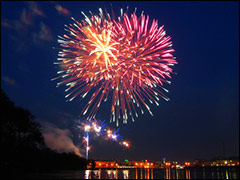Dear Umbra,
Our family has always lit a fair amount of fireworks for our 4th of July celebration. I would like to encourage my family and friends to find other ways to celebrate due to the CO2 emissions that will result. However, I don’t really know how much carbon is emitted. I already have to deal with the fact that many in my family are not taking climate change seriously, so I want to be knowledgeable when I state my case.
Donna
Elk Grove, Calif.
Dearest Donna,
Can one change a family tradition given only a few days of warning, let alone change it at all? Intra-family fireworks may result from your efforts to limit celebratory incendiary devices. But personal fireworks may be avoidable if your main concern is — as it should be — climate change. Although fireworks do give off carbon dioxide, they aren’t known for their greenhouse-gas impacts. They do have other potentially toxic components, and pollute air and water. Toxic enough to stop once-annual use? I’m ambivalent.

The cons bursting in air.
Photo: iStockphoto
The basic ingredients of a firework seem fairly simple: a powder and a fuse will make a loud bang, just as they do with a gun, and that’s called a firework. If the firework is physically designed to rocket, the explosion propels the rocketing element. There may be a delayed fuse, too, which will ignite various metals embedded in the rocketing firework in the form of “stars.” The stars burn up, sparkling as they fall to the ground. Or maybe in your home fireworks there are no “stars,” just one chunk of metal dust filled with colorant that lets off a nice sparkle. As for that whistling sound — yes, that is caused by our friend carbon dioxide. Who knew?
The more serious concerns, however, are things like the potassium perchlorate used as an oxidant in fireworks. Perchlorate, which messes with our thyroid glands, falls to the ground as the firework performs, and may fall into water, where it was recently studied by the folks at the National Risk Management Research Laboratory. Perchlorate in the lakes they studied rose precipitously after fireworks displays, but dissipated to background levels in about 80 days. Still, they are worried about aquatic life and need to look further into this, they concluded. I concluded, do not drink the water after the fireworks display.
The Disney Company has developed aerial fireworks that use compressed air in place of gunpowder, but those aren’t for backyard celebrations. Of course, the NRMRL wasn’t studying backyard fireworks, either.
The other small trouble with fireworks is the additives used to get nice colors. They’re usually heavy metals (lead and barium are two examples) with various human health risks attached. They are powdered and fall from the sky as the firework explodes. A few of the additives, such as copper salts, cause fireworks to produce small amounts of dioxins. And, of course, even if the dust weren’t all heavy metal, dust itself is difficult for those with asthma.
For your own family celebration, please consider that fireworks studies are usually done on large aerial displays, not backyard shindigs, so the bad should be taken with a grain of saltpeter. I’ll get in trouble for this, but I’m not sure your family needs to ban fireworks. It’s your decision, of course. If you do decide that the potential heavy-metal pollution is worth the family fight, my best suggestion for you is to bring a noise-sensitive dog or baby into the family, have everyone fall in love with it, and then plead no fireworks on its account come next year.
Independently,
Umbra


